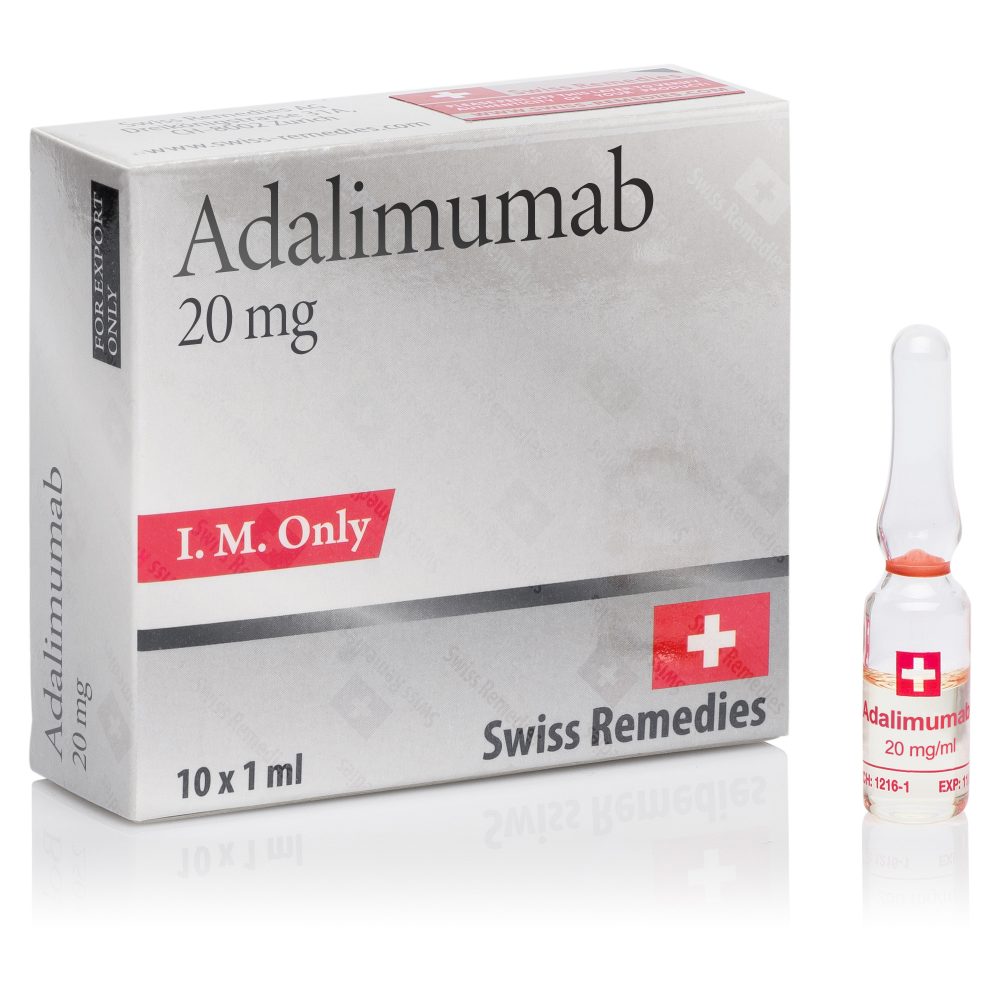Adalimumab
Contents: 20mg/Adalimumab (injections)
Side effects: Redness, itching, pain, or swelling at the injection site may occur. If any of these effects persist or worsen, tell your doctor or pharmacist promptly. Remember that your doctor has prescribed this medication because he or she has judged that the benefit to you is greater than the risk of side effects. Many people using this medication do not have serious side effects. Tell your doctor right away if you develop signs of infection while using this drug, such as: sore throat that doesn’t go away, cough that doesn’t go away, fever, chills, night sweats, trouble breathing, painful or frequent urination, unusual vaginal discharge, white patches in the mouth(oral thrush). Tell your doctor right away if you have any serious side effects, including: fast/irregular/pounding heartbeat, new or worsening symptoms of heart failure (such as shortness of breath, swelling ankles/feet, unusual tiredness, unusual/sudden weight gain), blood in the stools, mental/mood changes, severe headache, easy bruising or bleeding, leg pain or swelling, numbness or tingling of the arms/hands/legs/feet, unsteadiness, unexplained muscle weakness, difficulty with speaking/chewing/swallowing/facial movements, visionchanges, joint pain, butterfly-shaped rash on the nose and cheeks. Adalimumab may rarely cause serious (possibly fatal) liver disease in people exposed to hepatitis B virus. Your doctor may order blood tests and watch for symptoms during treatment and for several months after your last treatment. Get medical help right away if you have any symptoms of liver damage, including: nausea/vomiting that doesn’t stop, loss of appetite, stomach/abdominal pain, yellowing eyes/skin, dark urine. Get medical help right away if you have any very serious side effects, including: seizures, chest pain. A very serious allergic reaction to this drug is rare. However, get medical help right away if you notice any symptoms of a serious allergic reaction, including: rash, itching/swelling (especially of the face/tongue/throat), severe dizziness, trouble breathing. This is not a complete list of possible side effects. If you notice other effects not listed above, contact your doctor or pharmacist.
Administration: Read the Medication Guide and Instructions for Use provided by your pharmacist before you start using adalimumab and each time you get a refill. If you have any questions, ask your doctor or pharmacist. If you are using this medication at home, learn all preparation and usage instructions from your health care professional and the product package. Before using, check this product visually for particles or discoloration. If either is present, do not use the liquid. Do not shake this product. If you are removing this medication from the refrigerator, leave it at room temperature for 15 to 30 minutes before injecting. Do not warm up this medication any other way such as by heating in the microwave or placing in hot water. Use this medication exactly as prescribed. Inject this medication under the skin on the thigh or abdomen as directed by your doctor, usually every other week or once a week in some cases. If you are using this medication to treat psoriasis, hidradenitis suppurativa, Crohn’s disease, ulcerative colitis, or uveitis, your doctor may prescribe a different schedule/higher dose at the start of your treatment. Carefully follow your doctor’s directions for using this medication. Before injecting each dose, clean the injection site with rubbing alcohol. Change the injection site each time to lessen injury under the skin. New injections should be given at least 1 inch (2.5 centimeter) from an old site. Do not inject into any areas of the skin that are sore, bruised, red, or hard. Learn how to store and discard medical supplies safely. The dosage is based on your medical condition and response to treatment. In children, the dosage is also based on weight. Use this medication regularly to get the most benefit from it. To help you remember, mark the day on the calendar when you need to receive this medication. Do not increase your dose or use this drug more often or for longer than prescribed. Tell your doctor if your condition persists or worsens.
Details: Adalimumab is used to reduce pain and swelling due to certain types of arthritis (such as rheumatoid, psoriatic, juvenile idiopathic, ankylosing spondylitis). This medication is also used to treat certain skin disorders (such as plaque-type psoriasis, hidradenitis suppurativa). It works by blocking a protein (tumor necrosis factor or TNF) found in the body’s immune systemthat causes joint swelling and damage in arthritis as well as red scaly patches in psoriasis. Adalimumab belongs to a class of drugs known as TNF blockers. By reducing joint swelling, this medication helps to reduce further joint damage and preserve joint function. Adalimumab is also used to treat certain bowel conditions (Crohn’s disease, ulcerative colitis) and a certain eye disease (uveitis).


